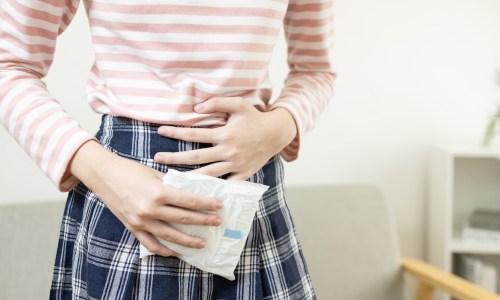What You Need To Know About the Seriousness of Period Poverty and How You Can Help
Not having the money to afford menstrual products is an issue. Here's how it can affect our mental and physical health, and how to help.

Not having the money to afford menstrual products, aka experiencing period poverty, is a difficult issue. Unfortunately, it’s not that surprising. Many states still have a tampon tax, which adds additional cost to the already pricey period products. The average menstruating person spends $17,000 on their period over a lifetime.
Experts in This Article
Jennifer Lincoln, MD, IBCLC is a board-certified OB/GYN and popular TikToker.
Naturally, this impacts many menstruators. More than 40 percent of people with a period have struggled to purchase products at some point, according to a YouGov survey on behalf of U by Kotex. And people in marginalized communities are affected most: A BMC Women’s Health study found that Black and Latina respondents reported period poverty at higher rates, as did first-generation college students.
Ultimately, period poverty has more negative effects than you might realize. It can hurt people’s physical and reproductive health, mental health, ability to go to school or work, and more. In honor of Period Poverty Awareness Week, we talked to a passionate expert about those effects and how you can help reduce the rates.
How period poverty affects your…
Mental health
“We know that people who experience period poverty are more likely to suffer from moderate to severe depression,” says Jennifer Lincoln, MD, IBCLC, a board-certified OB/GYN and popular TikToker. “This makes sense, since not being able to meet your basic needs is a huge stressor and source of anxiety for many.”
Physical and reproductive health
When people don’t have the money for period products, they may have to use things like toilet paper, rags, or towels, Dr. Lincoln says. She adds that some people may have the money, but not enough—which leads to them wearing a tampon, for example, for too long.
“This can definitely increase your risk of developing infections of the skin, vagina, and uterus. Toxic shock syndrome is one of those that we know is made more likely if tampons are used for longer than is recommended,” she explains.
Ability to go to work or school
Not only is period poverty a health issue, but it can make you more likely to miss school or work. “It’s hard to go to your job or a class if you don’t have a hygienic way to stop from bleeding onto your clothes,” says Dr. Lincoln. “When people miss work or school, and they are already living in poverty, this only perpetuates the cycle and widens the gap.”
Missing work or school is something many people experiencing period poverty have to face. Dr. Lincoln shared a survey that showed more than 4 out of 5 teens had missed school or knew someone who did because of their lack of access to products.
Getting behind on work and not being able to make money can also exacerbate someone’s depression and anxiety. It’s a cyclical problem that could easily make someone feel hopeless.
How we can work to end period poverty
Many necessary changes need to be made on a legislative level. “The biggest thing I can hope for is a change in what SNAP (previously known as food stamps) funds cover,” Dr. Lincoln says. She says that period products are not included right now, but they are essential.
Dr. Lincoln also talks about how we need to eliminate the tampon tax. “Tampons are not luxuries—save that tax for yachts and jewelry,” she says. (Thankfully, some congresswomen do care about that and are working to make change.)
However, there is something you can do on a more individual, local level: donate. Give some of your money to mutual aid funds, which are organizations that provide direct support for individuals within communities. Other ways to help? Put free products in the bathrooms at your workplace. Donate them to shelters if they’re in need.
And if you need period products, these five organizations offer free tampons and pads you can access.
As Dr. Lincoln says, it’s time to level the period playing field, and pads/tampons/et cetera should be just as accessible as toilet paper.
Sign Up for Our Daily Newsletter
Get all the latest in wellness, trends, food, fitness, beauty, and more delivered right to your inbox.
Got it, you've been added to our email list.










